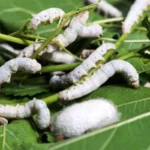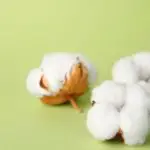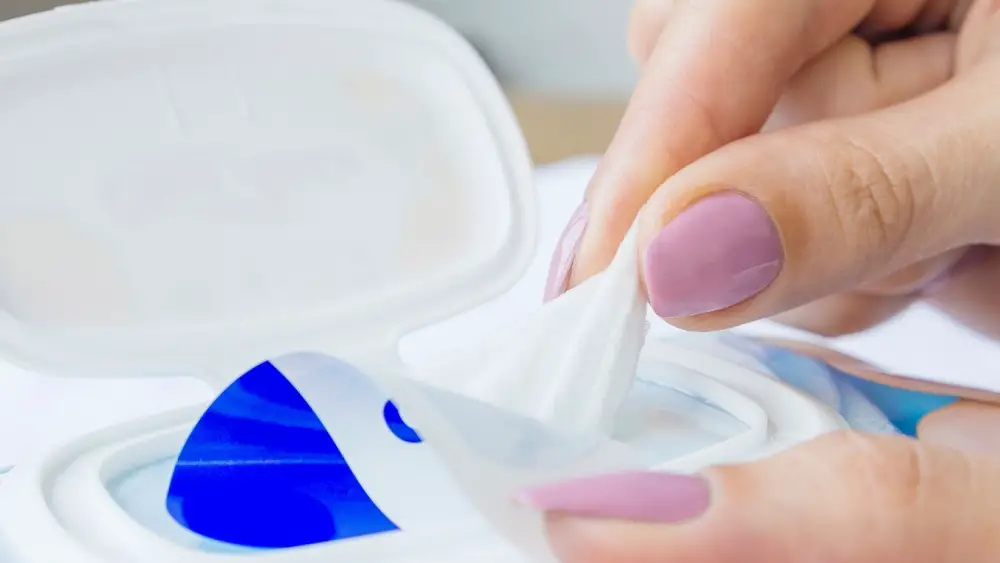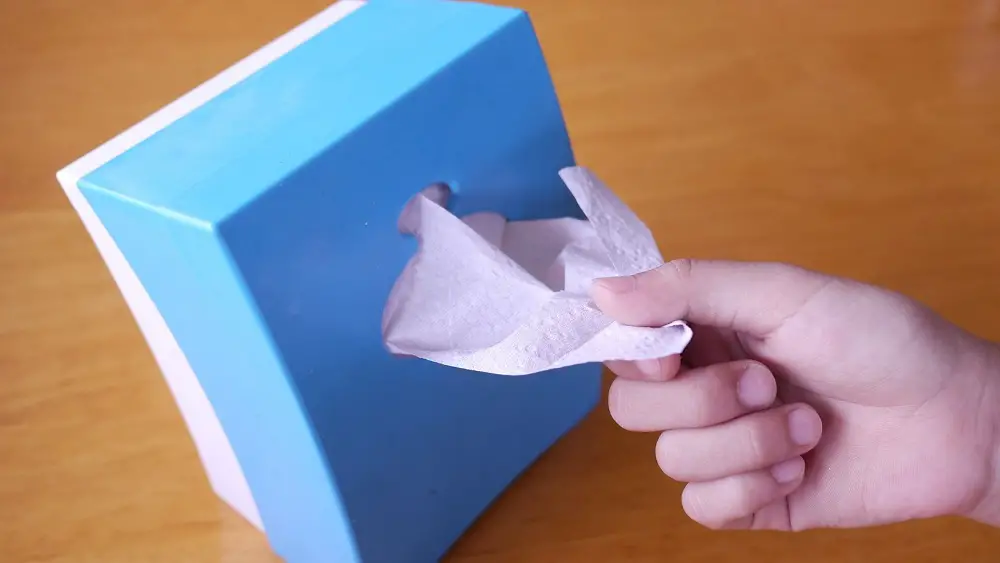Did you know that over 3.5 million babies are born in the USA every year, and that each baby uses an average of 2000 diapers in their first year of birth.
That means that an average of 7 billion diapers are thrown away per year, just from those used by newborns.
Now consider all the toddlers who are not yet potty trained and all the elderly and infirm who require adult diapers and you will see how huge the problem really is.
Latest figures suggest that over 18 billion diapers are actually tossed into landfill sites each year, which is over 3.4 million tonnes of waste. This is why finding an environmentally friendly alternative is of paramount importance.
What Does ‘Biodegradable’ Actually Mean?
Biodegradable objects are able to be decomposed and broken down by natural processes, bacteria and biological means. Only matter that has come from nature can be returned to nature in this way.
Therefore, manmade and synthetic fibres are not biodegradable and will sit in a landfill site for hundreds or even thousands of years.
Are Regular Diapers Biodegradable?
In a word, no. Regular, disposable diapers are made of plastics like SAPs and oil-based based fibres like polyethylene and polypropylene, and polyester.
The absorbent fluff pulp layer of a diaper contains chemicals that soak up human waste and reduce bad odours, but these chemicals are extremely bad for the environment when they eventually leak into the soil in a landfill.
A regular disposable diaper will sit in a landfill for around 500 years.
Are Regular Diapers Compostable?
Many people mistake compostable and biodegradable as being the same thing, however they are not. Some items are not biodegradable but will break down in the highly oxygenated and moisture-rich soil of a compost heap.
Compost heaps are not sealed off like landfill sites which means that the items inside them can break down more easily.
However, due to the highly manmade and synthesized makeup of regular diapers, they will not break down in a compost heap or a landfill site.
Are Regular Diapers Recyclable?
Regular diapers cannot be recycled either, due to their exposure to human waste. Human waste will contaminate other items in a recycling bin or center and make them unsafe to use.
If you dump your used diapers into a recycling bin you are not helping the environment but actually causing everything else in that bin to become contaminated and unrecyclable, which is a very negative outcome for the whole process.
How Should You Dispose Of Regular Diapers?
If you have to use regular diapers then the only way to dispose of them safely is to put them in the regular trash. It is actually best to scrape any excess feces into a toilet before rolling the diaper up, although many people skip this step.
By scraping excess feces into the toilet you minimize the bad odours and bacteria that you are exposing other people to while those diapers are in the waste. It is common practice to tie used diapers up in scented plastic diaper bags, which is socially very thoughtful but adds extra plastic and chemical waste to landfills.
If you can wrap used diapers in biodegradable diaper bags then that is one step better than plastic bags and is not much extra cost or effort.
Are ‘Biodegradable Diapers’ Really Biodegradable?
You may have noticed that there are many biodegradable diapers on the shelves these days, which advertise themselves as being more environmentally friendly.
In actual fact, there are no 100% biodegradable diapers available to buy, and many of those that advertise as being so are in fact only 60% biodegradable.
Some of the materials being used in these biodegradable diapers today include bamboo fibres, chlorine-free wood pulp, and biodegradable water-resistant outer sheets made with natural cotton and cornstarch paper.
The best of these brands achieves an 80% biodegradable product, which includes the packaging being biodegradable too. But even these top-end eco diapers will not break down if thrown in a landfill site because landfills are designed to keep air and microbes out.
For these diapers to decompose they must be disposed of in compost where oxygen and natural bacterias can break them down.
This is why you should take your biodegradable nappies to a composting facility, or even start your own compost heap at home, if you truly want to reduce your impact on the environment,
Are Biodegradable Diapers Eco-Friendly?
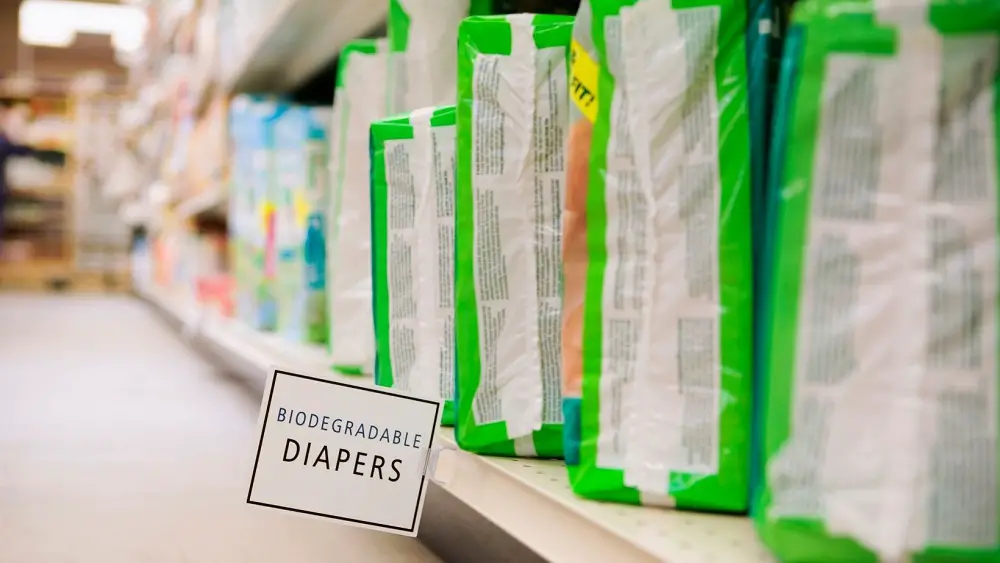
Of course, biodegradable diapers are much more eco-friendly than regular diapers if you dispose of them in the correct way.
However, they still contain certain chemicals that will seep into the soil of a compost heap which are not natural or healthy for the plants and animals in the surrounding area.
What is more, the production of biodegradable diapers is a huge industry with many large and environmentally damaging factories and processes.
The growing of cotton uses more water than is imaginable, as does that of bamboo and wood pulp.
The blending of these fibres requires machines which churn out carbon dioxide into the air, and the distribution of these products to superstores all over the world uses planes and trains and lorries which all contribute to global warming.
The main problem is just how many diapers get used every day, and how many are thrown away. Even if they are biodegradable, the sheer number of diapers makes them environmentally detrimental.
Are Cloth Diapers Eco-Friendly?
The most eco-friendly option available to mothers and babies today are the good old-fashioned cloth diapers that were used up until the 1970s.
Although these diapers are made from cotton which require lots of water to grow, and are distributed in the same way as regular diapers, using trains, planes and lorries, you can reuse them again and again.
This means that for every one cloth diaper you buy, you would throw away hundreds and hundreds of disposable diapers. Therefore, you will save money and the environment by buying cloth diapers.
And if you think that they are too difficult to use, too messy or unhygienic, just remember that your grandmother probably used them without thinking twice only a few generations ago.

